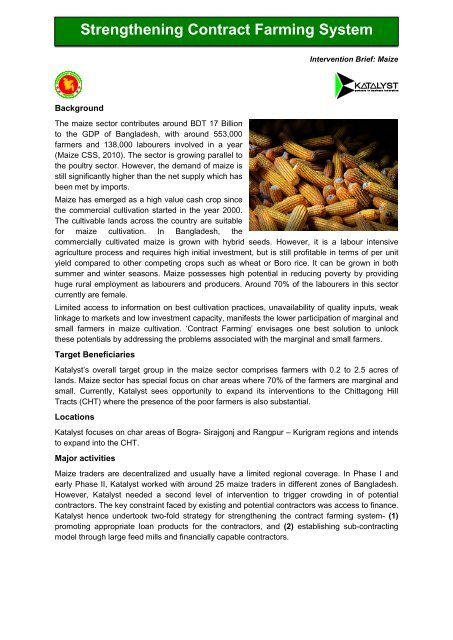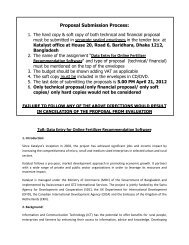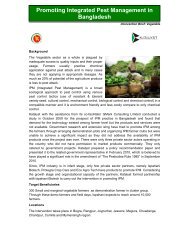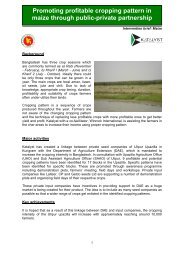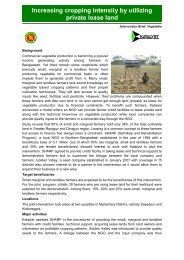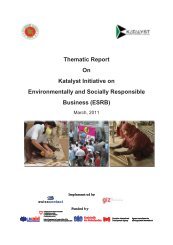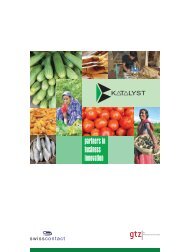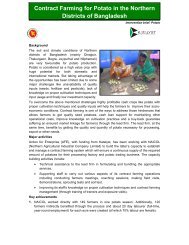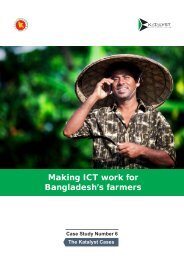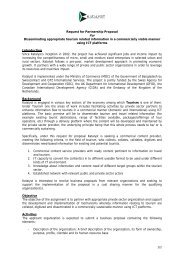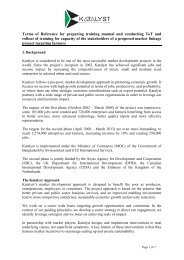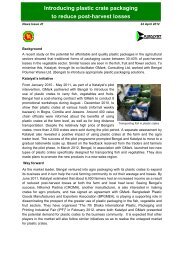Strengthening Contract Farming System - Katalyst
Strengthening Contract Farming System - Katalyst
Strengthening Contract Farming System - Katalyst
Create successful ePaper yourself
Turn your PDF publications into a flip-book with our unique Google optimized e-Paper software.
<strong>Strengthening</strong> <strong>Contract</strong> <strong>Farming</strong> <strong>System</strong><br />
Intervention Brief: Maize<br />
Background<br />
The maize sector contributes around BDT 17 Billion<br />
to the GDP of Bangladesh, with around 553,000<br />
farmers and 138,000 labourers involved in a year<br />
(Maize CSS, 2010). The sector is growing parallel to<br />
the poultry sector. However, the demand of maize is<br />
still significantly higher than the net supply which has<br />
been met by imports.<br />
Maize has emerged as a high value cash crop since<br />
the commercial cultivation started in the year 2000.<br />
The cultivable lands across the country are suitable<br />
for maize cultivation. In Bangladesh, the<br />
commercially cultivated maize is grown with hybrid seeds. However, it is a labour intensive<br />
agriculture process and requires high initial investment, but is still profitable in terms of per unit<br />
yield compared to other competing crops such as wheat or Boro rice. It can be grown in both<br />
summer and winter seasons. Maize possesses high potential in reducing poverty by providing<br />
huge rural employment as labourers and producers. Around 70% of the labourers in this sector<br />
currently are female.<br />
Limited access to information on best cultivation practices, unavailability of quality inputs, weak<br />
linkage to markets and low investment capacity, manifests the lower participation of marginal and<br />
small farmers in maize cultivation. ‘<strong>Contract</strong> <strong>Farming</strong>’ envisages one best solution to unlock<br />
these potentials by addressing the problems associated with the marginal and small farmers.<br />
Target Beneficiaries<br />
<strong>Katalyst</strong>’s overall target group in the maize sector comprises farmers with 0.2 to 2.5 acres of<br />
lands. Maize sector has special focus on char areas where 70% of the farmers are marginal and<br />
small. Currently, <strong>Katalyst</strong> sees opportunity to expand its interventions to the Chittagong Hill<br />
Tracts (CHT) where the presence of the poor farmers is also substantial.<br />
Locations<br />
<strong>Katalyst</strong> focuses on char areas of Bogra- Sirajgonj and Rangpur – Kurigram regions and intends<br />
to expand into the CHT.<br />
Major activities<br />
Maize traders are decentralized and usually have a limited regional coverage. In Phase I and<br />
early Phase II, <strong>Katalyst</strong> worked with around 25 maize traders in different zones of Bangladesh.<br />
However, <strong>Katalyst</strong> needed a second level of intervention to trigger crowding in of potential<br />
contractors. The key constraint faced by existing and potential contractors was access to finance.<br />
<strong>Katalyst</strong> hence undertook two-fold strategy for strengthening the contract farming system- (1)<br />
promoting appropriate loan products for the contractors, and (2) establishing sub-contracting<br />
model through large feed mills and financially capable contractors.
<strong>Katalyst</strong> works through Winrock International (co-facilitator) in<br />
the maize sector and major activities in this intervention<br />
entailed building capacity of the ‘contractors’ in terms of a)<br />
providing technical know-how on cultivation and usage of<br />
quality inputs for contract farmers, b) overall management of<br />
the business and c) strengthening links with banks, sources<br />
of quality inputs and feed mills (the ultimate buyers of the<br />
maize). In addition, <strong>Katalyst</strong> supported the contractors to<br />
demonstrate and promote best cultivation practices to wider<br />
group of maize farmers for future expansion. To strengthen the system further, <strong>Katalyst</strong> at<br />
present is supporting interested banks (such as Agrani Bank) to design a ‘dedicated credit line’<br />
that would enable banks to lend contractors at a lower risk than lending directly to farmers. At the<br />
same time, <strong>Katalyst</strong> supports expansion of contractors through the ‘sub-contracting’ model and<br />
by linking them to the large feed mills. <strong>Katalyst</strong> recently signed an MOU with Charoen Pokphand<br />
Group (CP) of Thailand in Bangladesh to develop its sub-contracting system in the CHT.<br />
Synergy<br />
As there are potentials to promote contract farming among female farmers, the maize team in<br />
<strong>Katalyst</strong> is working closely with the Gender and ESRB unit to realize this. Furthermore, synergies<br />
exist with the fertilizer and irrigation cross sector strategy to reduce excess usage of water and<br />
fertilizers in maize.<br />
Key achievements<br />
Till date <strong>Katalyst</strong> has benefited around 2000 farmers under maize contract farming system<br />
mainly in the chars. So far, 30 women (4 of whom worked as labour before) started maize<br />
cultivation with the support from one contractor. Due to contract farming, maize yield has been<br />
reported to increase from 5.5 MT to 7.5 MT per hectare. Average income has risen from BDT<br />
15,500 to BDT 23,500 per acre for char farmers as well as an increase in area coverage by 15%<br />
(approximately). To trigger more potential contractors to adopt the system and based on inputs<br />
from <strong>Katalyst</strong>, the Bangladesh Bank recently recognized maize as one of the key sectors for<br />
future investment and introduces “contract farming” as a means of “agricultural loan<br />
disbursement” for the financial institutions in its new “Agricultural /Rural Credit Policy and<br />
Program for the FY 2010-11”.<br />
<strong>Katalyst</strong> expects that by 2013 around 10,000 farmers will be benefited directly from the contract<br />
farming system in maize sector in Bangladesh.<br />
Way forward<br />
To ensure crowding in of contractors, <strong>Katalyst</strong> has started working with two financial institutions,<br />
Agrani Bank ltd. and National Bank ltd to develop and promote ‘dedicated credit line’ for the<br />
maize contractors and simultaneously support the development of sub-contracting model through<br />
large feed mill, CP feed ltd, as well. Furthermore, it plans to explore and realize the opportunities<br />
to unlock the transformation of women wage labourers to maize producers through the contract<br />
farming system.


